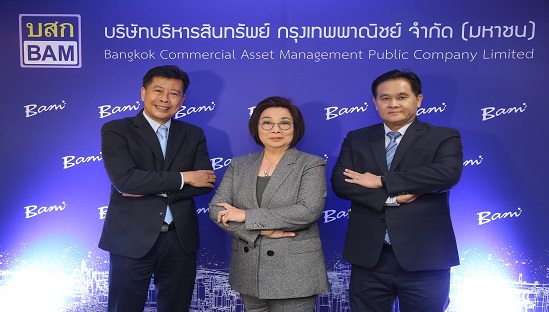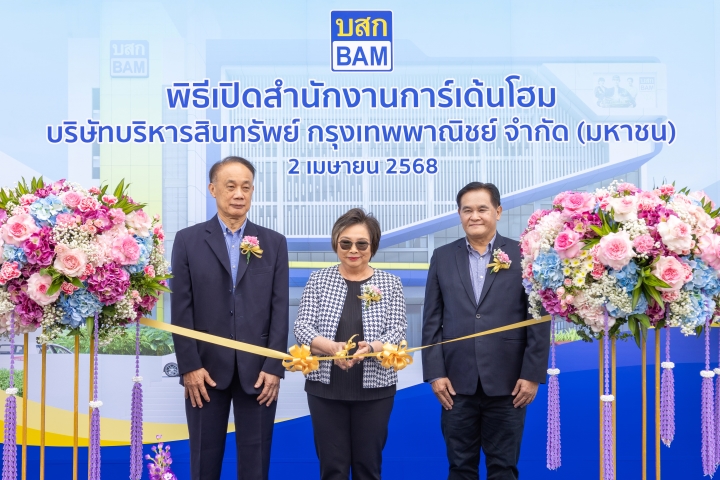หน้าหลัก > BAM News > BAM emphasizes its strength as Thailand’s top largest asset management company and is ready to unveil three strategies for creation of sustainable business opportunities.

BAM emphasizes its strength as Thailand’s top largest asset management company and is ready to unveil three strategies for creation of sustainable business opportunities.
BAM reiterates confidence in its long-term potential as Thailand’s largest asset management company,* remaining steadfast in resolving NPL and NPA problems facing the country. The Company also emphasizes the advantage of asset management business that can create business opportunities in any economic condition. It seeks to forge ahead with its three key strategies to drive ongoing solid growth.
In August 2019, the Company submitted the registration statement for securities offering and draft prospectus to the Securities and Exchange Commission (SEC) for the initial public offering (IPO) and listing of its shares on the Stock Exchange of Thailand (SET). The shares offered consist of 280 million newly issued ordinary shares, 1,255 million existing ordinary shares, and 230 million shares for a possible over-allotment (greenshoe), making up a total of not more than 1,765 million shares or representing 54.4% of the total issued and paid-up shares of the Company after this offering (given a full subscription for its newly issued shares). BAM will use proceeds from such fund mobilization for business expansion by purchasing NPAs for future sales, repayment of loans from financial institutions and/or repayment of debentures issued by the Company and/or notes payable that become due, and also as working capital.
Mrs. Tongurai Limpiti, BAM Chairwoman, expressed her confidence in the funding plan, “BAM is confident in our potential and strength as the biggest asset management company in Thailand, having longer than 20 years of experience in this business with varied sources of funds and strong operating performance. Over the past three years, the Company could successively post a net profit of more than Baht 4,500 million a year with average yearly asset growth of 7% and the most extensive network of 26 branch offices nationwide together with a highly experienced team. The key factor is that asset management business can find its opportunities in any economic environment. During an economic slowdown, the Company can shop for reasonably priced NPAs, while in a buoyant economic condition, our debtors will have a strong ability to pay their debts and customers will have buying power for our NPAs, thus helping to grow our revenues.”
“Listing on the SET will help enhance flexibility in our operation and ability to mobilize funds and gain access to more diverse financial instruments. BAM can serve as a key mechanism for tackling the NPA problems facing the financial sector in a more efficient manner,” said Mrs. Tongurai.
Mrs. Tongurai added, “NPA management is a promising business. Over the past five years, NPAs in the banking sector recorded a compound annual growth rate (CAGR) of 12.8%, whereas the most recent government land appraisal prices over the previous four years soared by an average of 27.7% for the whole country (source: Bank of Thailand and Treasury Department). With such business opportunities, BAM has devised three key strategies to pursue our growth and enhance our stability.”
Strategy 1: Expansion of Asset Base BAM closely monitors the sales of NPLs and NPAs in a bid to increase the opportunity of asset expansion and select high potential assets, thus enabling the Company to efficiently manage the acquisition cost. Besides, with our nationwide branch network and highly experienced staff who are well acquainted with the market, the Company can accurately assess the potentials and prices of assets.
Strategy 2: Reduction in Operation Time to Speed up Income Generation BAM gives importance to debt negotiations, streamlining of business process for efficiency enhancement, and allowance for debtors to repay their debts based on their ability to pay. BAM also makes certain that the debt restructuring negotiations will provide a solution as much satisfactory as possible to all parties. At the same time, the Company adopts a proactive marketing approach aided by technology such as website and social media.
Strategy 3: Development of Human Resource to Increase Corporate Potential BAM believes that talented and skillful employees are the key success factor and, hence, has arranged both in-house and off-premises employee training programs to develop employee capability and also has mapped out a clear succession plan.
BAM has been continuously successful in business operation, as evident from a 2018 net profit of Baht 5,202.02 million which grew by 15.58% y-o-y.”
From its inception to March 31, 2019, the Company has closed the accounts of credit for NPL purchase, computed from cost of purchase, in a total amount of Baht 90,562.65 million, with cash collection of Baht 122,931.74 million.
In 2018, BAM had total cash receivable from NPLs and NPAs of Baht 16,569.10 million, a surge of 22.59% from Baht 13,515.74 million in 2017, and enjoyed a net profit of Baht 5,202.02 million, up by 15.58% from Baht 4,500.82 million in 2017. As at March 31, 2019, BAM recorded credit for purchase of NPLs-net of Baht 74,482.33 million, of which the collateral value based on the appraisal price1 was Baht 187,875.26 million, and NPAs-net of Baht 21,731.04 million, whose value based on the appraisal price1 was Baht 50,287.17 million.
BAM has made continuous dividend payment with a policy to pay dividend at not less than 40.0% of net profit after deduction of income tax according to the separate financial statements and after appropriation of legal reserve.
BAM currently has a registered capital of Baht 16,225 million, divided into 3,245 million ordinary shares with a par value of Baht 5 per share, and an issued and paid-up capital of Baht 13,675 million, with the Financial Institutions Development Fund (FIDF) owning a stake of 99.99%. After the listing on the SET, FIDF has a policy to hold below 50% but not less than 45% of shares in BAM.
*Source: The industry situation report prepared by Ipsos Ltd.
Remark: 1Being the appraisal price according to the Bank of Thailand’s guideline and excluding installment payments.







